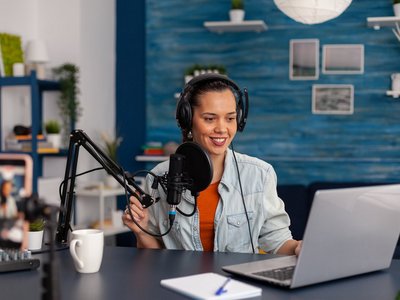

Under the title “Open your ears! Podcasts and radio formats for science communication”, the possibilities and challenges of audio formats in science communication were highlighted. Experts Dr. Christiane Attig (University of Lübeck) and Melanie Bartos (University of Innsbruck) provided exciting insights into their work.
Insights into the world of science podcasts
Christiane Attig, psychologist and experienced podcaster, opened the event with her presentation “Podcasting - The golden path of science communication?”. She explained that her own motivation to start podcasting was the desire to make scientific topics more accessible and to increase the visibility of women and non-binary people in science. She also shared insights from her research, which looks at the personality traits and motivation of podcast producers.
In the ensuing discussion, it became clear that podcasts are not only a way for researchers to communicate science, but also offer personal and professional added value - for example through networking, creativity and the development of new target groups.
Institutional formats and networks
Melanie Bartos, communications officer at the University of Innsbruck, highlighted the special features of institutional podcasts in her presentation “Making institutions audible - science communication in radio and podcasts”. Since 2014, she has been running one of the first university science podcasts in the German-speaking world and contributes her expertise as a long-standing radio producer. In addition to the technical implementation, a particular focus was
She also focused on collaborating with independent radio stations. Melanie Bartos shared valuable tips on how research institutions can design program content for independent radio stations and presented relevant networks in Austria.
Conclusion
The training course “Open your ears!” showed how diverse and effective audio formats can be for science communication. It provided both a theoretical classification of the topic as well as practical assistance in creating appealing and professional content.
